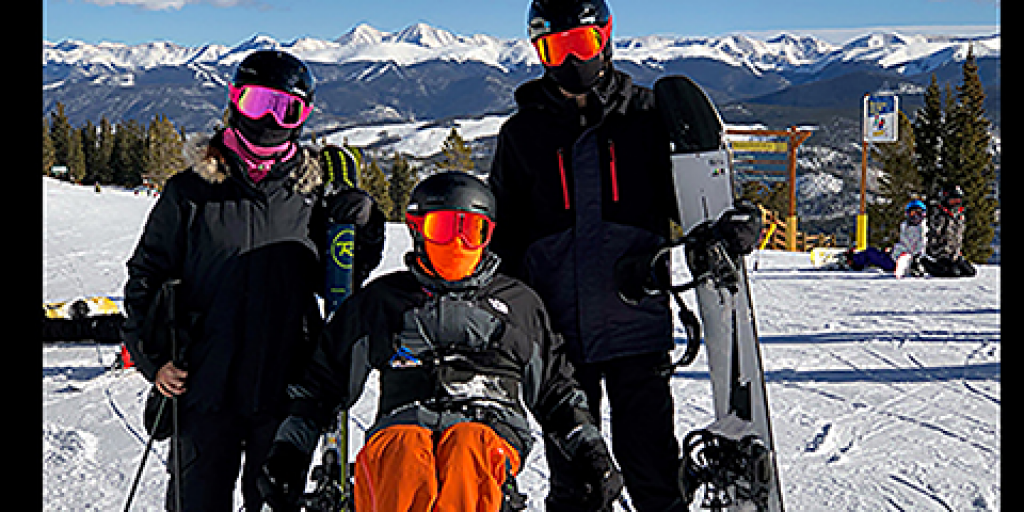Paralyzed Veteran learns to ski during pandemic

Army Veteran Thomas “Nate” Turner, Jr. grew up participating in just about every sport you can think of.
He was a four-sport varsity letterman at a very large Texas high school and went on to Midwestern State University where he participated in both football and track. But one horrible summer day, Turner’s life drastically changed.
In 2012, Turner was cooling off with friends and family at a nearby lake. One second, he was enjoying the breeze on a swing. The next, Turner was crashing to the ground, shattering his L-1 vertebrae, damaging his spinal cord, and losing all feeling and function from the waist down.
After two surgeries and two weeks in the hospital, Turner moved to a rehabilitation hospital where he spent the next three weeks learning how to walk again. He regained most of the feeling in his legs but lost nearly all the plantar flexion in both feet.
“I can no longer run, jump, or even stand on my tippy toes,” said Turner, who served as an Army counterintelligence special agent from 2001 to 2007 and deployed to Iraq in support of Operation Iraqi Freedom. “I am what you call a walking paraplegic.”
After his injury, Turner and his wife moved back home to the Houston area. There, he was introduced to the Spinal Cord Injury Clinic at the Michael E. DeBakey VA Medical Center.
“During my orientation, I met Recreation Therapist JeMarques Handy and was told that if there was anything athletic that I needed or wanted, he was the person to contact,” said Turner. “I had been riding a recumbent trike regularly but needed something a little more comfortable and challenging.”
“VA Recreation Therapy promotes wellness through leisure and physical activity,” said Handy. “Mr. Turner was a pleasure to work. He is an avid cyclist and I am glad to see him explore and excel at other adapted sports. Our Recreation Therapy department strives to encourage and support all Veterans, no matter where they are in their physical therapy journey.”
After a VA Cycling Clinic, Handy introduced Turner to a more advanced tadpole recumbent trike.
“My wife and I went on a trip to the Grand Canyon and took the trike with us. I got to ride on some beautiful trails and then some off-road mountain trails in Colorado Springs with a cousin,” said Turner. “The trike gave me new-found adrenaline rush and sense of freedom as I was zooming down the mountain. The trike is definitely something that I am very, very grateful for and can’t thank JeMarques and the Houston VA enough.”
After the successful riding adventure, Turner turned his focus to skiing, discovered an adaptive bi-sit-ski, and signed up for lessons.
“This was the first time since I broke my back that I felt the excitement and adrenaline of being an athlete. I was hooked on adaptive skiing from that point on. I told my wife that I wanted to go skiing every year,” said Turner, who is looking forward to participating in VA’s National Disabled Veterans Winter Sports Clinic.
While VA was forced to cancel this year’s event because of the COVID-19 pandemic, a virtual event will take place March 29 – April 2. Download the app at Veterans Winter Sports Clinic or search the App store for “Veterans Winter Sports Clinic” and sign-up before March 1.
A world leader in rehabilitation, the National Disabled Veterans Winter Sports Clinic provides nearly 400 profoundly disabled Veterans with training and rehabilitation every year. Veterans with traumatic brain injuries, spinal cord injuries, visual impairments, amputations, and other severe disabilities are challenged to overcome perceived limitations through adaptive skiing, sled hockey, scuba diving, rock wall climbing, education, and other activities.
For more information about the National Disabled Veterans Winter Sports Clinic, VA adaptive sporting events, or Houston VA’s Recreation Therapy, call 713-791-1414, ext. 23537.
